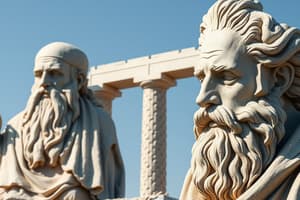Podcast
Questions and Answers
Which philosopher is associated with the concept of the 'social contract'?
Which philosopher is associated with the concept of the 'social contract'?
- Mill
- Rousseau (correct)
- Hobbes
- Locke
Which document is associated with the declaration of individual rights and freedoms in Canada?
Which document is associated with the declaration of individual rights and freedoms in Canada?
- Declaration of Independence
- The Enlightenment
- Canadian Charter of Rights and Freedoms (correct)
- Declaration of the Rights of Man and Citizen
Which historical events are linked to the development of liberal and progressive thought?
Which historical events are linked to the development of liberal and progressive thought?
- The Enlightenment (correct)
- French Revolution
- Feudalism
- American Revolution
Which ideology emphasizes the collective ownership of resources and the absence of social classes?
Which ideology emphasizes the collective ownership of resources and the absence of social classes?
In a direct democracy, how are decisions made?
In a direct democracy, how are decisions made?
Study Notes
Social Contract Philosophy
- Jean-Jacques Rousseau is a key philosopher associated with the concept of the 'social contract,' which explores the legitimacy of political authority and the agreement between individuals to form societies.
Canadian Declaration of Individual Rights
- The Canadian Charter of Rights and Freedoms, enacted in 1982, outlines the fundamental rights and freedoms guaranteed to all Canadians, including freedom of expression, the right to equality, and the right to legal protection.
Historical Events Influencing Liberal and Progressive Thought
- The Enlightenment period, characterized by intellectual exchange and the rise of reason, significantly shaped liberal thought in the 17th and 18th centuries.
- The American Revolution (1775-1783) promoted ideas of democracy and individual liberties, inspiring subsequent movements globally.
- The French Revolution (1789) propelled themes of equality, fraternity, and liberty, introducing concepts of popular sovereignty and citizen rights.
Ideology of Collective Ownership
- Communism emphasizes the collective ownership of resources and aims for a classless society, where all property is publicly owned, and each person works and is paid according to their abilities and needs.
Decision-Making in Direct Democracy
- In a direct democracy, decisions are made by the direct participation of citizens, typically through referendums, where individuals vote on specific policy initiatives or laws rather than electing representatives to make those decisions.
Studying That Suits You
Use AI to generate personalized quizzes and flashcards to suit your learning preferences.
Description
Test your knowledge of political ideologies, philosophers, and principles with this quiz. Explore concepts like collectivism, individualism, common good, liberalism, capitalism, communism, and more.




